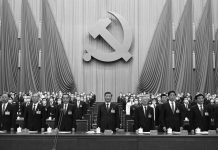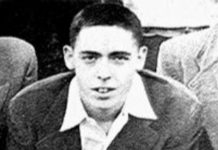Ceases the fire in icy places provoked by the melody of a violin masterfully played. Temporary truces to play a Christmas soccer game with the enemy troops.
Fraternization with prisoners. Events that occurred at the times that were most needed to occur. Because there were plenty of complicated situations. Moments and places of heroism and terror, mixed with masses of bodies, fire and mud. Places like Normandy, Dunkirk, Auschwitz or the Ardennes. These, in one way or another, became an important part of World War II. JG Ballard.
JG Ballard.
But if there is something else that all these sites have in common, it is that they are in old Europe. In fact, most books, series or movies bring us closer to all these places over and over again. Probably because that was where the conflict originated. Today, on the other hand, we are going to fly to China, specifically to Shanghai, to witness first-hand how the Second World War was in that place so far from Europe; all thanks to James Graham Ballard and his bookThe Empire of the Sun.
In Empire of the Sun we are going to see the war through the eyes of a boy named Jim. He lives in Shanghai with his parents: wealthy Britons who have lived in the city since before he was born. The beginning of the novel is complicated and somewhat cumbersome since the protagonist must explain all the political tensions that existed at that time. “In real war no one knew which side they were on, and there were no flags, commentators, or winners.”. Relations between China and Japan were very tangled and it is already difficult to understand even if they explain it to you.
The short and simple version would be something like: the Chinese and the Japanese had been waging an undeclared war since the latter invaded them in 1937. Thus, an unstable tense calm existed in the city. For Europeans living in settlements where Western life was led, despite atrocities taking place on the streets, none of this seemed to affect them. In fact, at the beginning, Jim’s disconnection, laziness, with that world is even violent for the reader. But all this changes when the Japanese attack Pearl Harbor and enter World War II, also making their position in the war clear. That is when they come into action in Shanghai.The empire of the sun gives its starting signal. Survival at all costs through adaptation and hope as a lifeline. This sentence could summarize JG Ballard’s novel, since it is entirely about this. Well, our young protagonist will be separated from his parents and will have to find a life, first through the streets of a convulsive and violent Shanghai and then in Lunghua, a prison camp in which he will be confined. The boy will become a methodical being, with a special talent for manipulation and negotiation.
Survival at all costs through adaptation and hope as a lifeline. This sentence could summarize JG Ballard’s novel, since it is entirely about this. Well, our young protagonist will be separated from his parents and will have to find a life, first through the streets of a convulsive and violent Shanghai and then in Lunghua, a prison camp in which he will be confined. The boy will become a methodical being, with a special talent for manipulation and negotiation.
Something that will be of vital help to him in the prison camp to trade and be able to feed himself better than most. On the other hand there is his faith; faith in finding his parents, in reuniting with them at all costs, a faith that collides with the fear that all that will end. Well, Jim gets used to that life, a habit or a kind of Stockholm syndrome that he fears will end, because he prefers a routine world at war than the uncertainties that a world at peace may bring.
And in all of this he makes the reader participate with his deepest and most intimate thoughts while sharing his respectful, almost poetic, self-absorption by the planes that fly over the Shanghai sky. And it is clear that from the reader’s perspective Jim’s way of thinking and acting at first seems cryptic and inexplicable, especially in those scenes in which Jim professes an almost absurd veneration towards the Japanese soldiers who have him imprisoned. a habit or a kind of Stockholm syndrome that he fears will end, since he prefers a routine world at war to the uncertainties that a world at peace may bring.
And he makes the reader participate in all of this with his deepest and most intimate thoughts while at the same time sharing his respectful, almost poetic, self-absorption by the planes that fly over the Shanghai sky. And it is clear that from the reader’s perspective Jim’s way of thinking and acting at first seems cryptic and inexplicable, especially in those scenes in which Jim professes an almost absurd veneration towards the Japanese soldiers who have him imprisoned.
Based on the author’s own experiences, Empire of the Sun by JG Ballard is an essential war novel that tells us about survival, overcoming and hope in that decisive moment when a child reaches adolescence. In it we will face scenes that will give us goosebumps, that will leave us with a lump in the throat or that will raise certain moral debates, all narrated with a prose, reminiscent of the journalistic chronicle, and that becomes descriptive to the millimeter but without falling into sensationalism.




































